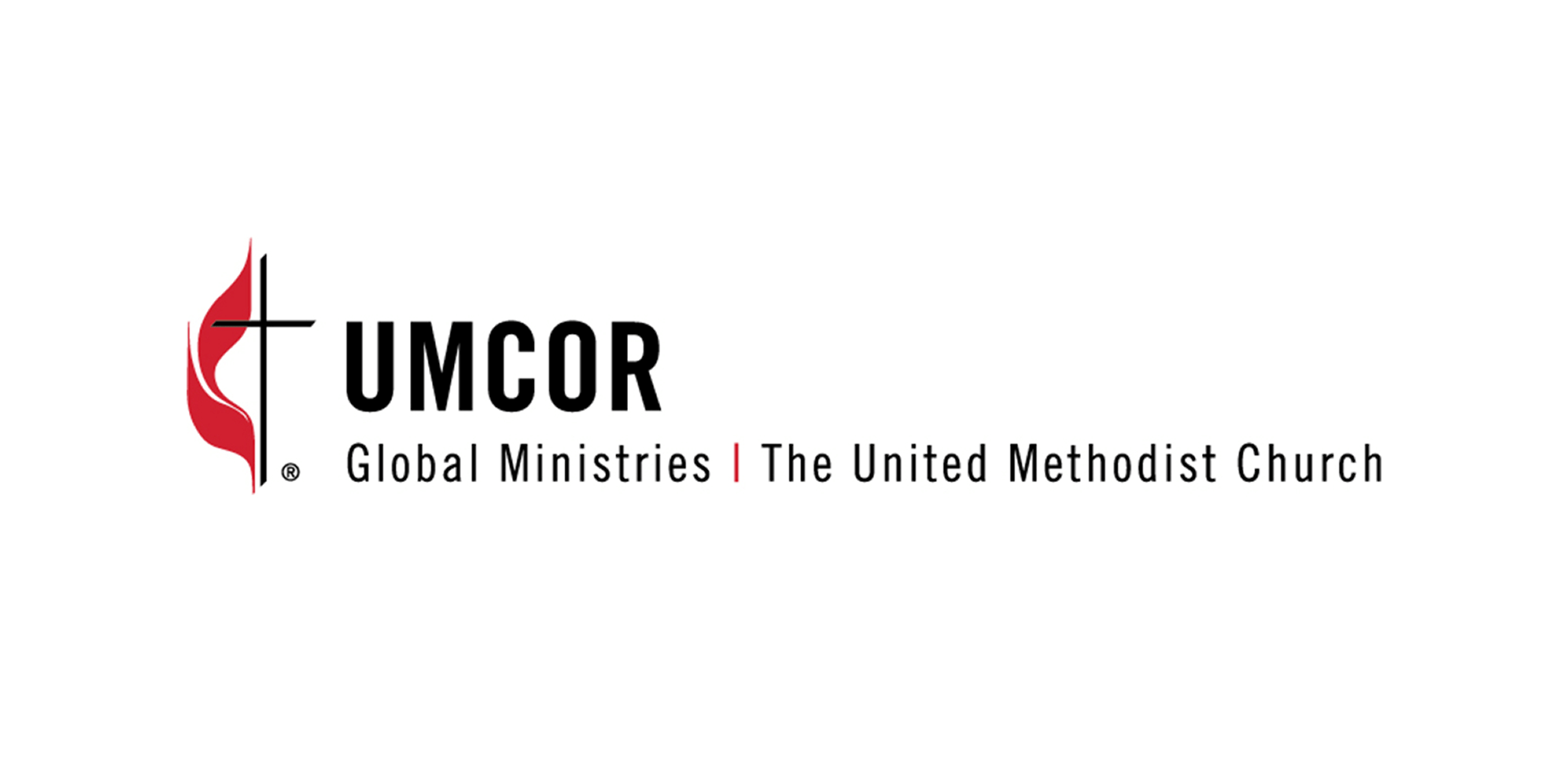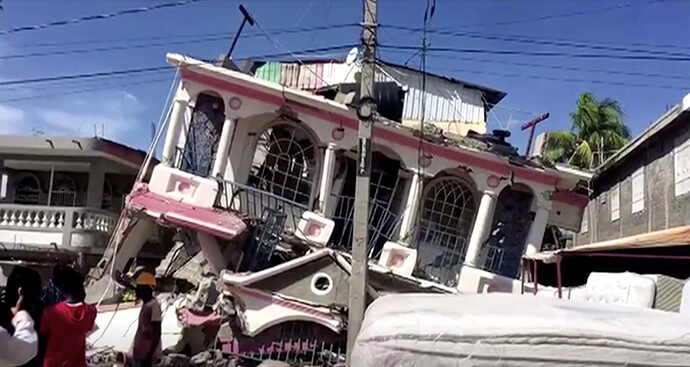Standing with Haiti amid quake and storm

A bulldozer works at the site of the collapsed Hotel Le Manguier in Les Cayes, Haiti, Monday, Aug. 16, 2021, two days after a 7.2-magnitude earthquake struck the southwestern part of the country. (AP Photo/Matias Delacroix)
By Heather Hahn
August 16, 2021 | UM News
- United Methodists are working with longtime partners in Haiti to respond after a 7.2-magnitude earthquake and as a major storm approaches.
- Church members helped rebuilding efforts after the 2010 earthquake that claimed the lives of hundreds of thousands people, including United Methodist workers.
- The United Methodist Committee on Relief is collecting donations and working on next steps to help the impoverished country, which also faces political unrest, gang violence and COVID-19.
United Methodists are reaching out with their prayers and pocketbooks as Haiti faces a devastating earthquake and encroaching major storm.
The United Methodist Committee on Relief is collecting financial donations through its International Disaster Response and Recovery Advance fund. The relief arm, part of the United Methodist Board of Global Ministries, also is in conversation with partners on the ground about next steps.
“In the aftermath of Saturday’s earthquake, we grieve alongside the people of Haiti as the staggering loss of life and level of devastation becomes clear,” said Roland Fernandes, the top executive of Global Ministries and UMCOR.
“UMCOR stands firm in its commitment to alleviate suffering and is working with partners on how to best meet basic and immediate needs as it has done in the past.”
Many individual United Methodists also are working with their longtime partners in the Caribbean island nation to extend a helping hand.
Still, a variety of factors complicates the church’s response to the second catastrophic earthquake to ravage the impoverished nation in 11 years. Those factors include the ongoing COVID-19 outbreak and a severe economic downturn made worse by gang violence and political unrest. Just a little over a month ago, the country’s President Jovenel Moise was assassinated.
So far, the death toll has climbed to some 1,300 people following the 7.2-magnitude quake that struck Haiti’s southwest peninsula Aug. 14. The temblor — with an epicenter about 78 miles (125 kilometers) west of capital Port-au-Prince — triggered landslides, collapsed buildings and sent aftershocks across the country.

David Draeger, mission volunteer coordinator for the Methodist Church in Haiti, told the Michigan Conference that church buildings in the region have sustained damage and many Haitians still do not know the fate of loved ones.
With thousands of people injured and others still trapped in rubble, Haitian authorities are racing to ramp up rescue efforts and relieve overwhelmed hospitals. Tropical Depression Grace is lashing the island with heavy rains today.
A mobile medical team from Petit Goâve near Port-au-Prince has already deployed to the affected region. The team is funded by a partnership between Highland Park United Methodist Church in Dallas and the United Methodist Church of the Resurrection in Leawood, Kansas.
Highland Park United Methodist, in the past week, also sent disaster-relief funding through Food for the Poor to help respond to the country’s ongoing COVID-19 outbreak.
“HPUMC has a longstanding strong commitment to the people of Haiti, and although our physical presence has been limited due to the pandemic and political instability, we are committed to continued service to our friends and neighbors there,” said Caroline Hazlett, the congregation’s impact coordinator for health partnerships and disaster response.
Hazlett’s father, Dr. Otto Willbanks, and other church members established an eye clinic in Haiti in 1976. A team from the church was working at the clinic on Jan. 12, 2010, when a 7.0 earthquake near Port-au-Prince caused the death of hundreds of thousands of people and caused the clinic’s roof to collapse. Team member Jean Arnwine died of her injuries.
That earthquake also cost the lives of two executives from the United Methodist Board of Global Ministries — the Rev. Sam Dixon, who then led UMCOR, and the Rev. Clinton Rabb, head of Volunteers in Mission.
But amid the tragic loss, United Methodists quickly returned to the country to join hands with the Eglise Méthodiste d’Haïti (Methodist Church of Haiti) in recovery efforts. That included Highland Park, which rebuilt and expanded the Polyclinique Siloe to care for more than people’s eyesight.
United Methodists also participated collectively in relief, donating some $45 million to UMCOR for the earthquake response.
Debra Buzard, outreach director for First United Methodist Church in Kearney, Missouri, was among those who volunteered in rebuilding efforts. Her church now aims for sustainable development. The church started the ministry Partners in Education Haiti, which provides scholarships to some 30 students and also supports their families.
Buzard also serves on the advisory council of a Haitian orphanage for about 40 children with disabilities. Both the orphanage and the students are located miles away from the epicenter in Port-au-Prince, but they still felt the tremors.
“They are all OK, but there is a lot of fear,” she said. “Here is the problem that is going to affect the orphanage and the families we work with. It’s the perfect storm.”
She pointed to COVID-19, the ongoing crisis in government and the extreme gang violence as part of that perfect storm. Gangs have taken over key access roads to parts of Haiti, including around the quake’s epicenter near Les Cayes. Relief workers initially used helicopters and boats to bring aid.
A gang leader said Aug. 15 that the armed groups had declared a truce along the road to Les Cayes, and a convoy has arrived by ground.
The United Nations is calling for a “humanitarian corridor” to allow relief supplies to pass through gang-held territories.
Valerie Mossman-Celestin is among those looking toward more sustainable development that can promote stability and economic independence.
The United Methodist deaconess is U.S. executive director for Haitian Assets for Peace International, or HAPI, which helps fund a clinic and a vocational training center in Mizak. The community is also miles away from the quake’s epicenter; however, the vocational training center HAPItech is still recovering from a July fire that claimed its computers and more than $5,300 in cash.
“What we’re trying to do is to give real opportunities to women in Haiti through better health care, education, and jobs,” Mossman-Celestin said.
She acknowledged that some people might feel like they are trying to “fill a bucket with a hole at the bottom.”
She said God calls people to respond with compassion and relief to disaster. “But we also need to build in an approach that continues to break the cycle of dependency,” she said.
Bishop Kenneth Carter, in an email to the Florida Conference, encouraged United Methodists to remember: “God is our refuge and strength… And Jesus is with us in the midst of the storm.”
He also urged Florida Conference churches to receive a special offering for Haiti this coming Sunday, Aug. 22.
“May we draw near to God and to one another in a spirit of generosity toward our neighbors in a moment of crisis and with faith that God will provide,” he wrote.
Hahn is an assistant news editor for UM News. Contact her at (615) 742-5470 or newsdesk@umcom.org.

